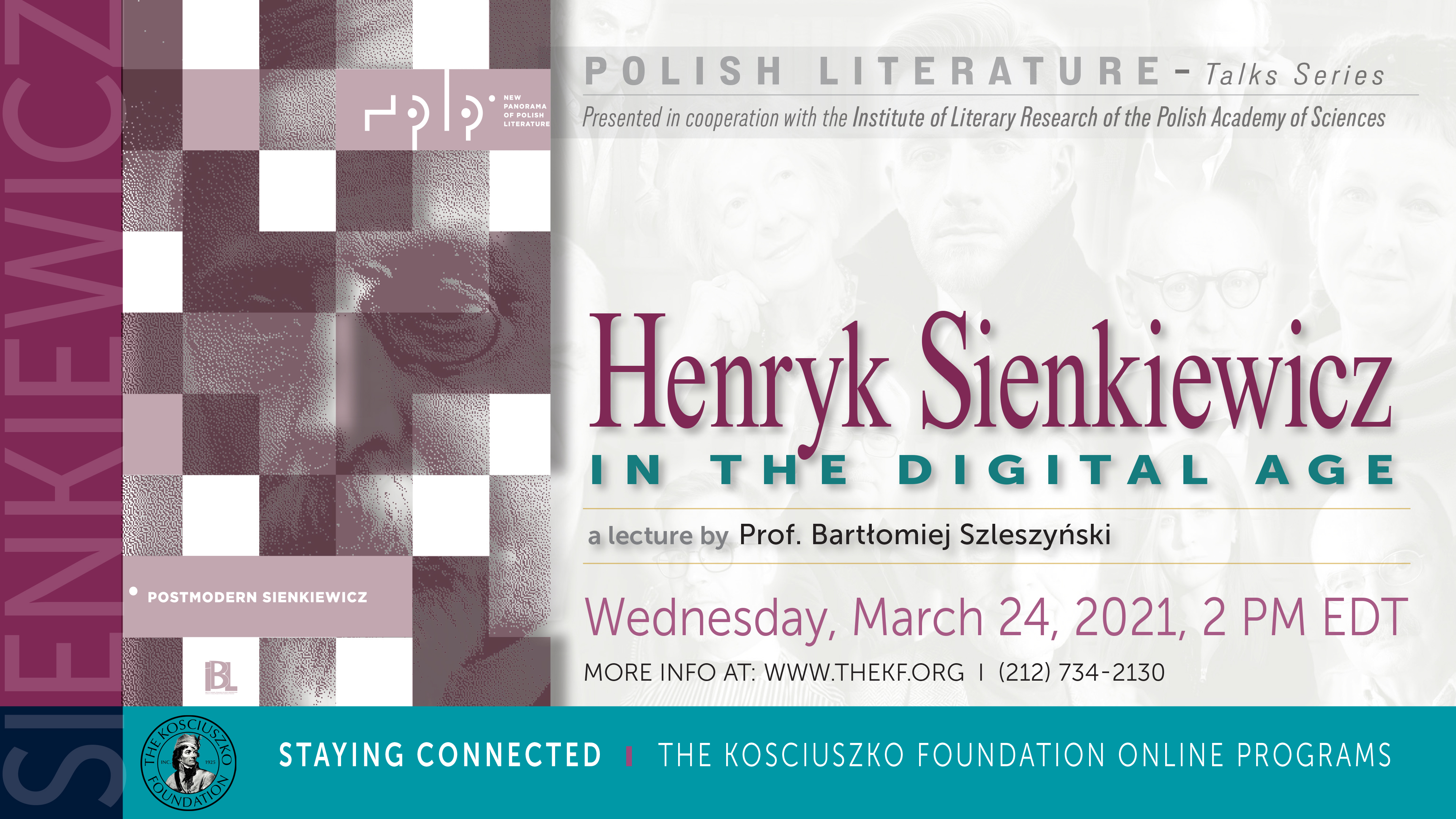Henryk Sienkiewicz in the digital age - a webinar with Prof. Bartlomiej Szleszynski / in cooperation the Kosciuszko Foundation and the Institute of Literary Research of the Polish Academy of Sciences
To fulfill its mission of fostering intellectual exchanges between the United States and Poland and bringing what's best in the Polish culture to the American audience, the Kosciuszko Foundation has partnered with the Institute of Literary Research of the Polish Academy of Sciences in presenting a series of webinars dedicated to Polish literature.
In this coming spring, researchers of the Institute - established scholars, authors, and literary experts will delve into thought-provoking works by some of the most influential and internationally recognized Polish writers.
Please check out the series' upcoming events, save the date, and join us live on Zoom for informative lectures which provide you with insights into important messages conveyed by the authors.

WEDNESDAY, MARCH 24, 2021, AT 2:00PM
Does Henryk Sienkiewicz, a man from the age of steam, have his place in the digital age culture? Is this writer, Nobel prize winner, whose novels were once absolute bestsellers still interesting for scholars and the audience at the beginning of the 21st century? Or could he potentially be?
The lecture will try to answer these questions, showing some digital scholarly stories told about Henryk Sienkiewicz's life, work, and reception (for example, his journeys to America and Africa or monuments for Sienkiewicz erected over the years). It will also analyze traces of Sienkiewicz's presence in contemporary culture - including novels, films, and video games.
Bartłomiej Szleszyński - professor at the Institute of Literary Research, Polish Academy of Sciences, head of the New Panorama of Polish Literature team, responsible for creating and operating NPLP.PL, a platform publishing digital scholarly collections, and TEI.NPLP.PL, a platform for scholarly digital editions, deputy director of the Digital Humanities Centre.
His main research interests are literature of the second half of the nineteenth century, colonial discourse in nineteenth-century Polish culture, literary Sarmatism, digital humanities and scholarly digital editions. Published Przymierzanie kontusza. Henryk Rzewuski i Henryk Sienkiewicz – najwybitniejsi twórcy XIX-wiecznego nurtu sarmackiego [Trying on the Kontush: Henryk Rzewuski and Henryk Sienkiewicz, the most notable representatives of the nineteenth-century Sarmatian trend]; Non omnis moriar? Bolesław Prus, wiek XIX i opowieści współczesne, [Non omnis moriar? Bolesław Prus, the nineteenth century and contemporary novels]. Co-edited: Przerabianie XIX wieku [Rethinking the nineteenth century]; Realiści, realizm, realność [Realists, realism, reality], Sienkiewicz ponowoczesny [Postmodern Sienkiewicz].
The lecture is presented in cooperation with the Institute of Literary Research of the Polish Academy of Sciences and is part of the Tadeusz Solowij Lectures of the Kosciuszko Foundation.
The webinar is free and open to the public. Registration is required. An unlimited number of registrations will be accepted, however a maximum of 100 participants will be allowed to join on a first-come-first-served basis. The recording of the lecture will be posted on the Foundation's YouTube channel.
Information
See also
CLARIN Café III - CLARIN for Researchers: Literary Studies (organized by CLARIN Ambassador Dr. Maciej Maryl, Institute of Literary Research of the Polish Academy of Sciences)
This panel is a part of the CLARIN Café series, as well as the first of the planned events dedicated to an overview of the application of digital tools in SSH disciplines. The goal of the meeting is to introduce digital methods to literary scholars on the example of the tools provided by CLARIN. We plan to showcase some successful research projects and sketch the potential of digital approaches to literary studies. The desired outcome for the audience would be to sparkle their engagement with digital tools, methodologies and projects relevant to their interests, as well as to draw their attention to CLARIN national nodes.
Władysław Reymont through the prism of film adaptations (Andrzej Wajda and others) - A lecture and multimedia presentation by Prof. Tomasz Żukowski
On June 8, Prof. Tomasz Żukowski will examine Reymont’s texts and their adaptations in the context of the discussion about how national history relates to the history of social groups and the conflicts between them. The lecture is presented in cooperation with the Institute of Literary Research of the Polish Academy of Sciences and is part of the Tadeusz Solowij Lectures of the Kosciuszko Foundation.
Marxist Literary Research in Polish Peoples Republic and Czechoslovak Republic and their contexts. 1944-1956
Ośrodek Studiów Kulturowych i Literackich nad Komunizmem zaprasza na dwudniowe warsztaty polsko-czeskie poświęcone marksizmowi w badaniach literackich w latach 1945-1955 w Polsce i Czechosłowacji: "Marxist Literary Research in Polish Peoples Republic and Czechoslovak Republic and their contexts. 1944-1956". Warsztaty odbędą się w Pałacu Staszica, Nowy Świat 72 w sali 144, w dniach 22-23 listopada. Wstęp wolny. Język obrad: angielski.
Cultures of Dissent in Eastern Europe (1945-1989): Research Approaches in the Digital Humanities
This 7-day seminar in digital humanities research methods is designed to expose a new generation of scholars in Cold War history and culture to methods of analysis and discovery involving computational techniques. Designed and run by NEP4DISSENT (New Exploratory Phase in Research on East European Cultures of Dissent), COST Action 16213, the inspiration for the course is built around the transfer of knowledge from technologists and data scientists to humanists.